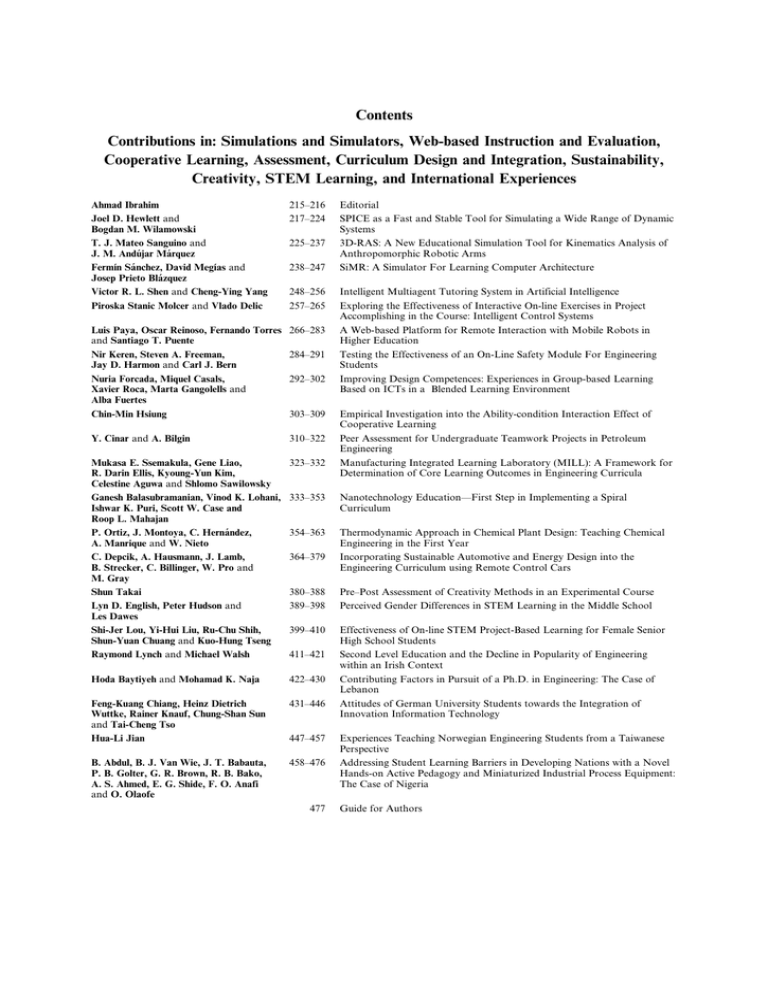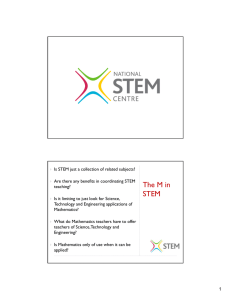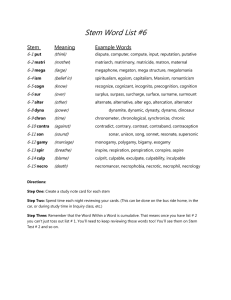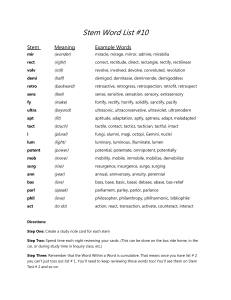Contents Contributions in: Simulations and Simulators, Web-based Instruction and Evaluation,
advertisement

Contents Contributions in: Simulations and Simulators, Web-based Instruction and Evaluation, Cooperative Learning, Assessment, Curriculum Design and Integration, Sustainability, Creativity, STEM Learning, and International Experiences Ahmad Ibrahim Joel D. Hewlett and Bogdan M. Wilamowski T. J. Mateo Sanguino and J. M. Andújar Márquez Fermı́n Sánchez, David Megı́as and Josep Prieto Blázquez Victor R. L. Shen and Cheng-Ying Yang Piroska Stanic Molcer and Vlado Delic Luis Paya, Oscar Reinoso, Fernando Torres and Santiago T. Puente Nir Keren, Steven A. Freeman, Jay D. Harmon and Carl J. Bern Nuria Forcada, Miquel Casals, Xavier Roca, Marta Gangolells and Alba Fuertes Chin-Min Hsiung 215–216 217–224 225–237 238–247 248–256 257–265 266–283 284–291 292–302 303–309 Y. Cinar and A. Bilgin 310–322 Mukasa E. Ssemakula, Gene Liao, R. Darin Ellis, Kyoung-Yun Kim, Celestine Aguwa and Shlomo Sawilowsky Ganesh Balasubramanian, Vinod K. Lohani, Ishwar K. Puri, Scott W. Case and Roop L. Mahajan P. Ortiz, J. Montoya, C. Hernández, A. Manrique and W. Nieto C. Depcik, A. Hausmann, J. Lamb, B. Strecker, C. Billinger, W. Pro and M. Gray Shun Takai Lyn D. English, Peter Hudson and Les Dawes Shi-Jer Lou, Yi-Hui Liu, Ru-Chu Shih, Shun-Yuan Chuang and Kuo-Hung Tseng Raymond Lynch and Michael Walsh 323–332 Editorial SPICE as a Fast and Stable Tool for Simulating a Wide Range of Dynamic Systems 3D-RAS: A New Educational Simulation Tool for Kinematics Analysis of Anthropomorphic Robotic Arms SiMR: A Simulator For Learning Computer Architecture Intelligent Multiagent Tutoring System in Artificial Intelligence Exploring the Effectiveness of Interactive On-line Exercises in Project Accomplishing in the Course: Intelligent Control Systems A Web-based Platform for Remote Interaction with Mobile Robots in Higher Education Testing the Effectiveness of an On-Line Safety Module For Engineering Students Improving Design Competences: Experiences in Group-based Learning Based on ICTs in a Blended Learning Environment Empirical Investigation into the Ability-condition Interaction Effect of Cooperative Learning Peer Assessment for Undergraduate Teamwork Projects in Petroleum Engineering Manufacturing Integrated Learning Laboratory (MILL): A Framework for Determination of Core Learning Outcomes in Engineering Curricula 333–353 Nanotechnology Education—First Step in Implementing a Spiral Curriculum 354–363 Thermodynamic Approach in Chemical Plant Design: Teaching Chemical Engineering in the First Year Incorporating Sustainable Automotive and Energy Design into the Engineering Curriculum using Remote Control Cars 364–379 380–388 389–398 Pre–Post Assessment of Creativity Methods in an Experimental Course Perceived Gender Differences in STEM Learning in the Middle School 399–410 Effectiveness of On-line STEM Project-Based Learning for Female Senior High School Students Second Level Education and the Decline in Popularity of Engineering within an Irish Context Contributing Factors in Pursuit of a Ph.D. in Engineering: The Case of Lebanon Attitudes of German University Students towards the Integration of Innovation Information Technology 411–421 Hoda Baytiyeh and Mohamad K. Naja 422–430 Feng-Kuang Chiang, Heinz Dietrich Wuttke, Rainer Knauf, Chung-Shan Sun and Tai-Cheng Tso Hua-Li Jian 431–446 B. Abdul, B. J. Van Wie, J. T. Babauta, P. B. Golter, G. R. Brown, R. B. Bako, A. S. Ahmed, E. G. Shide, F. O. Anafi and O. Olaofe 458–476 447–457 477 Experiences Teaching Norwegian Engineering Students from a Taiwanese Perspective Addressing Student Learning Barriers in Developing Nations with a Novel Hands-on Active Pedagogy and Miniaturized Industrial Process Equipment: The Case of Nigeria Guide for Authors




